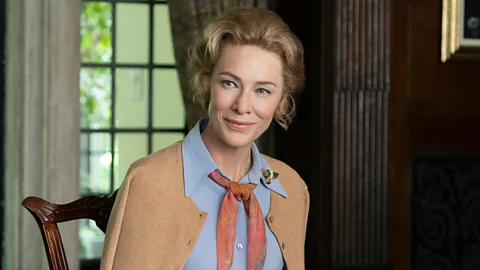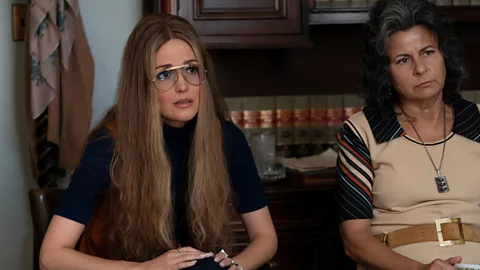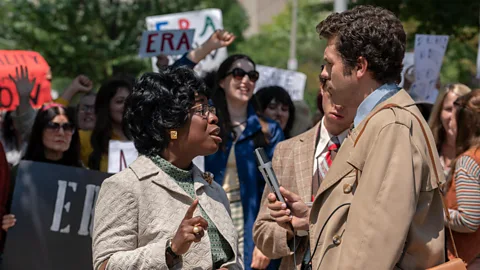Mrs America review: A smart tale of an anti-feminist icon
 FX/Hulu
FX/HuluThis star-studded biopic of leading conservative activist Phyllis Schlafly sees Cate Blanchett shine in a role that requires her to become progressively meaner, writes Caryn James.
With its echoes of a beauty pageant and a far-distant culture, the title Mrs America perfectly captures the retro setting of this smart, colourful series about the 1970s battle to add the Equal Rights Amendment (ERA) to the US Constitution. That amendment, which simply states that women cannot be deprived of rights on the basis of sex, was brought down almost singlehandedly by Phyllis Schlafly, played by Cate Blanchett with the real Schlafly’s beehive hairdo and prim country-club lady’s wardrobe. Schlafly was a well-to-do wife and mother from middle America who wrote political books and spouted what she called stay-at-home “traditional family values” while organising a powerful conservative movement. Dropping off home-baked bread and jam in Congressmen’s offices turned out to be a jaw-droppingly effective lobbying strategy.
If Mrs America were landing in more normal times, it would instantly seem potent, delivering a resonant message: women’s rights and other issues surrounding the ERA are still unresolved. Arriving in the midst of this all-consuming pandemic, the series is, oddly enough, a great distraction. It offers an absorbing escape into a richly-realised past, full of drama and infighting, with a range of vibrant characters on both sides of the divide, including the brash ERA-ing Congresswoman Bella Abzug (Margot Martindale) and the glamorous feminist standard-bearer Gloria Steinem (Rose Byrne). And it stands as a reminder of where we’ll still be when the cloud lifts, and of how we got here. Schlafly’s cultural conservatism included working against abortion rights and same-sex marriage, issues that have become political lightning rods again in the Trump era. The series pointedly reminds us that Schlafly’s blinkered version of the US never really went away.
 FX/Hulu
FX/HuluThe series’ structure works brilliantly. The overarching story is chronological, beginning in 1972 when the ERA has ed Congress and is gaining momentum towards being ratified by the 38 states needed. As the story weaves back and forth between the pro and anti-ERA camps, almost each of the 10 episodes focuses on a single character. Instalments called Phyllis, Shirley, Gloria and more become mini portraits of distinct characters in action. Richly detailed, the series sweeps us back into a time of typewriters, the start of the pioneering feminist publication Ms Magazine and era-defining songs like The Age of Aquarius and Raindrops Keep Fallin’ on My Head.
A remarkable set of actresses
The show clearly takes the pro-ERA side, and Blanchett does a remarkable job of keeping our attention without encouraging iration for Schlafly. She adopts a sweet cloying voice and has a permanently fixed smile as she talks about the “libbers”, using the then-common derisive term for the women’s liberation movement. The organisation she founds is called STOP ERA. The STOP, she blithely proclaims, stands for Stop Taking Our Privileges. From the comfort of her spacious house, while the full-time housekeeper cooks and cleans, and her sister-in-law helps care for the children, Schlafly meets with her group of like-minded, comfortably middle-class female friends. They make calls and write newsletters warning that the ERA would subject women to the draft, allow same-sex marriage and, most horrendously of all, make abortion legal.
Blanchett subtly allows Schlafly to become harder and meaner as she becomes more powerful and power-hungry. But she never loses that frozen smile, placidly absorbing sexism along the way. Having written about foreign policy, she finds herself the sole woman in a room of men lobbying Congress, and is asked to take notes because, “You probably have the best penmanship”.
Martindale is ideally cast as the brash Abzug, an idealist but also a practical politician who knows what she can and cannot get through Congress. Tracey Ullman creates a nuanced portrait of the headstrong Betty Friedan, author of the groundbreaking book The Feminine Mystique. Friedan believes she is underappreciated, and is often a thorn in the side of others in the movement, resisting their for gay rights so as not to distract attention from the women’s cause.
The two sides confront each other at debates and conventions, with Abzug and Friedan calling out Schlafly as a hypocrite who idealises homebound marriage and motherhood while flying around the country giving speeches. “She might be one of the most liberated women in America,” Abzug says.
 FX/Hulu
FX/HuluUzo Aduba (Suzanne in Orange is the New Black) is fierce and poignant as Shirley Chisholm, the first black woman in Congress, who runs for president. Aduba captures her strength, ion and sense of abandonment when she is persuaded it's time to drop out of the presidential race. There is no need to be familiar with the histories of these real-life women, as the series gracefully fills in the background, and the actors make them dynamic individuals whose ideas and strategies change as the fight goes on.
‘Shirley’, one of the strongest episodes, is directed by Amma Asante. The series’ on-screen feminism is mirrored behind the scenes, too. With the exception of the duo of Anna Boden and Ryan Fleck (Captain Marvel), all the directors are women, as is the show’s creator, Dahvi Waller (Mad Men).
As Steinem, Byrne tries so hard to reproduce her calm, near-monotone delivery that the portrayal borders on caricature. That distance from reality may seem especially jarring because Steinem is still with us, as recognisable as ever. Sarah Paulson, always a strong presence on screen, plays a fictional character, Schlafly’s adoring best friend. Her trajectory becomes crucial, if a bit too conveniently plotted, as the series moves towards its end. It is 1980, Ronald Reagan is elected president, and the ERA comes up three states short of ratification despite an extended deadline. Schlafly has won, but “She is not going to have the last word,” Steinem tells Friedan.
Schlafly’s actual last published words were prophetic, as the end titles remind us. The day after she died, in September 2016, just two months before the presidential election, her final book was published. Its title: The Conservative Case for Trump. And here we are.
★★★★☆
Mrs America premieres on 15 April on FX on Hulu in the US, and later this year on BBC2 in the UK.
Love TV? BBC Culture’s TV fans on Facebook, a community for television fanatics all over the world.
